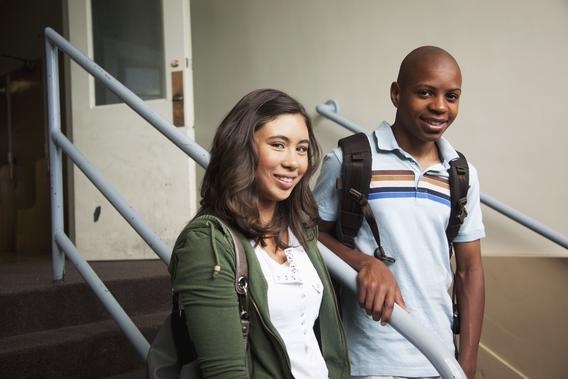
Transforming School Climate and Student Behavior: Relationships are Key
Can creating school environments that center learning as relational and view conflict as a natural part of community result in higher achievement?
St. Paul Public Schools (SPPS) and the St. Paul Federation of Educators (SPFE), along with researchers from UMN HYD-PRC want to find answers to this question. Kara Beckman, HYD-PRC senior evaluator, and Barb McMorris, associate professor, have teamed up with SPPS to evaluate whether or not implementing restorative practices in schools can promote change.
Restorative practices are an approach for developing equitable relationships, engaging students in learning, and responding to disciplinary concerns by ensuring accountability to relationships. Restorative practices are grounded in a common mindset among indigenous cultures and communities of color that views individuals as profoundly interconnected and inherently good. Emanating from this mindset are practices that establish relationships and repair or restore relationships when harm is caused. In contrast, current school practices do not necessarily provide space or value for intentional development of inclusive relationships, especially at middle and high school levels, and disciplinary practices frequently establish accountability to rules rather than relationships.
During the 2016-17 school year, SPPS and SPFE began a partnership, codified in their bargaining agreement, to pilot whole school restorative practices in 12 schools. Schools were chosen through an application process that required 75% of building educators to explicitly approve becoming a pilot site. Each school received funding to develop and implement a 3-year whole school implementation plan. However, SPPS had not budgeted for an evaluation to assess the effectiveness of the pilot. Beckman, who has been working with evaluations of community- and school-based restorative practices programs for over 10 years, was aware of the pilot. She worked with McMorris to secure 15 months of funding from the UMN’s Center for Urban and Regional Affairs to begin evaluation activities with pilot schools and then to continue collecting process and outcomes data through external service contracts with SPPS.
An important next step was to secure funding for continued evaluation of the 12 pilot schools as they completed their 3-year implementation plans and for expansion of the SPPS whole school restorative practices program. In partnership with SPPS, Beckman and McMorris submitted a grant to the US Department of Education (DOE). In October 2018, the school district-university team was awarded five years of funding ($3,997,860) from the US DOE Office of Innovation and Improvement to support expansion and evaluation of whole school restorative practices. Beckman and McMorris hope to collect implementation and outcomes data that demonstrate pathways for transforming school climate and creating inclusive environments/communities while reducing chronic absenteeism and discipline referrals.
“We are excited to be involved in this work because of the alignment we see between restorative practices and healthy youth development,” said Beckman, “This is a natural extension of the work of our HYD-PRC to build capacity among professionals who work with youth in school, community, and clinical settings.” In particular, this partnership and federal funding provides an opportunity to evaluate the impact of a community-developed innovation that provides experiences and supports to help children and youth gain key skills including perspective-taking, identifying values, expressing complex emotions, and establishing strong, pro-social relationships –all critical skills for the healthy development of students.